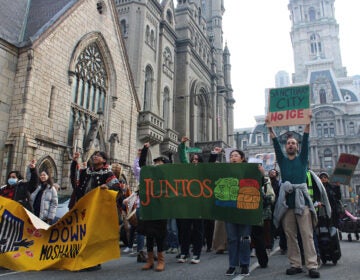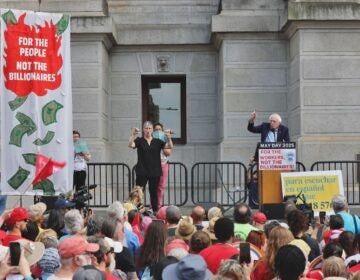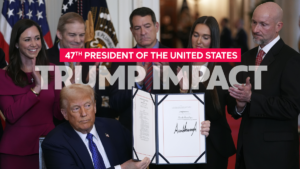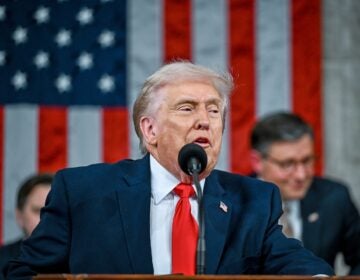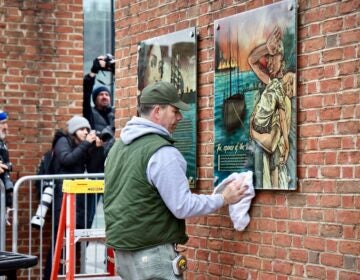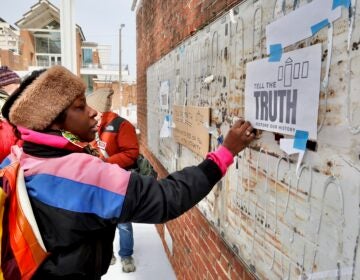Trump looks to target ‘sanctuary cities’ as Philadelphia gets ready for potential budget attacks
Philly boasts a long history as a “sanctuary city,” but its current status will be put to the test as leaders face being cut off from federal funding.
Listen 0:59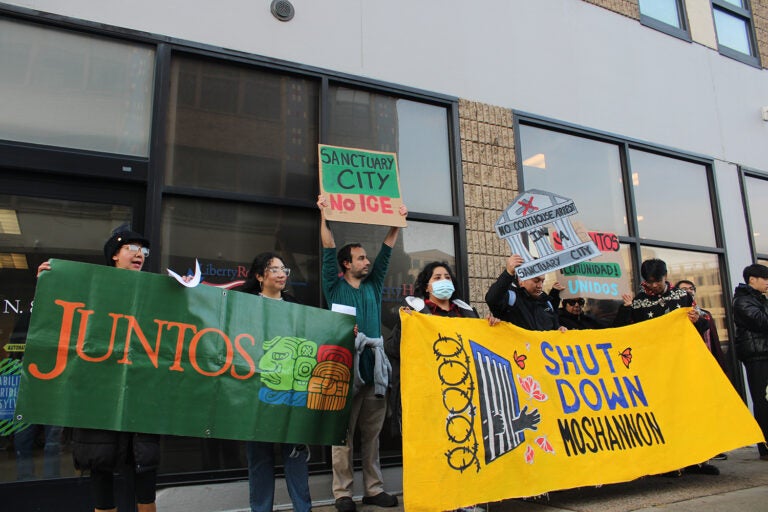
Immigrant rights advocates marched to the Philadelphia ICE Office, on 8th and Cherry streets, to amplify calls for the release of Seyrerath "One" Van and other Philadephia immigrants who have been detained or deported. (Emily Neil/WHYY)
From Philly and the Pa. suburbs to South Jersey and Delaware, what would you like WHYY News to cover? Let us know!
President Donald Trump signed an executive order Monday, targeting “sanctuary cities,” jurisdictions that limit cooperation with federal immigration enforcement. The move potentially puts Philadelphia once again in the crosshairs of a president that has made deporting undocumented residents central to his administration.
The order mandates the Department of Homeland Security and the attorney general to identify noncompliant jurisdictions within 30 days, potentially leading to losses in federal funding as well as legal actions against them.
Philadelphia will likely be included in such a list.
Domenic Vitiello, associate professor of city planning and urban studies and author of “The Sanctuary City,” says the city’s longstanding commitment to protecting its immigrant communities has often made it a target.
“For the last 24 years, Philadelphia has been on the map of sanctuary city and county and state jurisdictions that’s updated regularly by the Center for Immigration Studies in Washington,” he said, referring to the research organization and think tank that advocates for limiting immigration to the U.S. and boasts an affiliation with Stephen Miller, Trump’s homeland security advisor and White House deputy chief of staff for policy.
Vitiello noted that the city was also targeted during Trump’s first term when he issued a similar executive order, which sought to withhold federal funding from sanctuary cities. That order was permanently blocked by a federal judge, who ruled it unconstitutional, stating that the executive branch cannot impose new conditions on federal grants without congressional approval.
A long history of sanctuary
Philadelphia started as something of a “sanctuary city” when William Penn founded it in 1682, with the goal to create a city that was socially just and religiously tolerant.
Philadelphia’s modern sanctuary policies began to take formal shape during the administration of Mayor Michael Nutter, who signed an executive order in 2009 prohibiting city workers, including police and health officials, from inquiring about immigration status or detaining individuals solely based on it.
However, Nutter also later started to cooperate with U.S. Immigration Customs and Enforcement, or ICE, and protests led the city to change course. In 2014, Nutter signed an executive order significantly limiting the city’s cooperation with federal immigration officials, including prohibiting ICE holds.
That put the city in the sights of Republicans as early as 2015 as they attempted to punish Philadelphia and other jurisdictions for the policies. However, Mayor Jim Kenney, who took office in 2016, further advanced Philadelphia’s sanctuary status.
“Mayor Kenney had a much more humanistic and faith-based set of reasons for valuing immigrants as people and not just economic units, let’s say,” Vitiello said. Nutter “canceled key parts of our sanctuary policy in the last couple of weeks of his administration as a favor to the Obama administration at that point, but Kenney signed it back into force on day one.”
Philadelphia’s sanctuary status drew renewed national attention during the first Trump administration. In 2017, the U.S. Department of Justice threatened to withhold federal grant money from cities that did not comply with stricter immigration enforcement cooperation. Philadelphia sued the federal government, arguing that the conditions were unconstitutional.
In a landmark 2018 ruling, U.S. District Judge Michael Baylson sided with Philadelphia, stating that the Justice Department could not withhold grant funding based on the city’s sanctuary policies. He emphasized that Philadelphia’s policies did not make it a sanctuary for anyone involved in criminal conduct.
The legal challenge
Jennifer Lee, an associate professor of law at Temple University, said that the 10th Amendment is clear that “the federal government can’t coerce states and localities to do the federal government’s job,” which includes immigration enforcement.
“If instead they’re trying to just kind of leverage it through funding, it’s a little bit more of a legally complicated question,” she said. “But I still think that there’s some good law out there that basically says that they can’t just willy-nilly cut all this funding from states and localities because they don’t like what they’re doing and try to make them do something else.”
However, she added that recent events make it difficult to foresee the outcome this time around, even when the law appears clear. Philadelphia — which received $2.2 billion in federal funding in the last fiscal year, nearly one-fifth of its total budget — would be severely impacted if the president makes good on his promise.
That has some city leaders concerned. City Councilmember Rue Landau said that much of those federal dollars “went largely toward health and social services programs.”
“Trump’s executive order stands to cut off life-saving initiatives and endanger Philadelphians who are trying to make ends meet,” she said. “Philadelphia has stood strong as a welcoming city for all, and the President’s attempt to hold cities like ours hostage for caring for our residents will put lives at risk and rip apart families.”
Mark Umansky, Ninth Ward Republican Leader, says he disagrees with the city’s sanctuary policies but agrees with Landau that cutting off federal funds would harm the city and its residents.
“As the son of legal immigrants, I strongly oppose policies that reward jumping ahead of the line — but I also believe that punishing our city by withholding federal funds is the wrong approach,” he said. “I urge the administration to work with local leaders to fix our broken immigration system without hurting the hard-working taxpayers who call this city home.”
Mayor Cherelle Parker has vocally reaffirmed the city’s dedication to protecting immigrant communities, telling reporters that “the city’s 2016 executive order remains in place” shortly after news of Trump’s executive order was released.
“Right now, we remain laser focused on doing everything in our power on a daily basis to stay focused on achieving the goal,” she said. “I promised people of our city that I wouldn’t let anyone or anything get in the way of my commitment to making Philadelphia safer, cleaner, greener with access to economic opportunity for all, because that’s what the people in the city of Philadelphia sent me here to do.”
Parker added, however, that she would not comment on hypothetical “if/then” statements.
“If any formal activity occurs, we will respond accordingly,” she said.
But some activists said she hasn’t been sufficiently clear in her stance and are urging Parker to strengthen sanctuary protections.
“We want her to publicly declare that she will stand by sanctuary and defend against the enforcement actions of Trump,” Erika Guadalupe Núñez, executive director of the immigrants rights organization Juntos, said at a rally. “[At] the same time, we want to [say] that sanctuary is a lot more than just ending collaboration between ICE and police, if not also making sure our schools are sanctuary schools, that there is no arena in Chinatown, and that our community members don’t have to fear rampant enforcement.”
News outlets across the country have reported on ICE enforcement actions in schools and at courthouses, including one that led to the arrest of a county judge in Wisconsin.
In January, School District of Philadelphia Superintendent Tony Watlington reaffirmed the district’s commitment to “creating safe, welcoming space for our students and families, in alignment with the U.S. Constitution, Pennsylvania State law, and in the spirit of the Board of Education’s Welcoming Sanctuary Schools Resolution,” which was first issued in 2021.
Lee suggests that another step the city can take is properly training city law enforcement and other officials how to respond when encountering ICE. She said that would help ensure that the city’s sanctuary city policies are enforced and that those faced with the dilemma of what to do in tense situations know that the law is on their side.
“I’m sympathetic to that person who’s guarding the door,” she said. “Those are not easy jobs and choices to make, but that’s where training is so important because these policies have been vetted and they’ve been vetted in terms of being constitutional policies, they have the constitutional prerogative to enact them. So to do your job well, you just need to follow the policy.”
District Attorney Larry Krasner agreed saying, “We’re going to have to teach people who took an oath to uphold the law in the Constitution of the United States, what to do when the opposite is going on.”
He added that there have been “anecdotal” reports of ICE officials breaking local law in the course of enforcement operations, but that his office would not hesitate to hold them accountable if they had “solid information” about an incident.
“The Constitution of the United States and the laws of the United States protect you all, including people who are undocumented,” he said. “I am a law enforcement officer. My job is to uphold the Constitution and laws. I intend to do just that and if Trump doesn’t like it, he can F around and find out.”
Editor’s note: This story has been updated to clarify Ninth Ward Republican Leader Mark Umansky’s disagreement with the city’s sanctuary policies.

Get daily updates from WHYY News!
WHYY is your source for fact-based, in-depth journalism and information. As a nonprofit organization, we rely on financial support from readers like you. Please give today.



